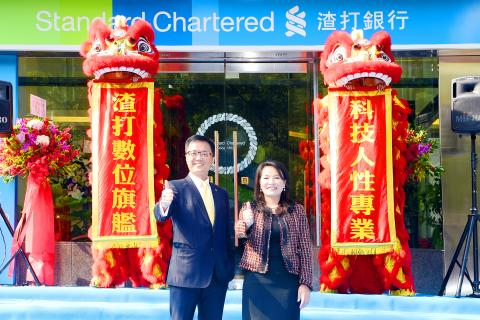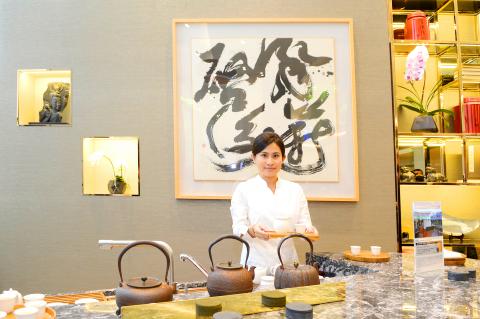Standard Chartered Bank yesterday opened a flagship digital branch in Taipei, the first iWealth center in the Asia-Pacific region, as the British banking group is seeking to better serve customers who increasingly carry out transactions online.
The iWealth center comes as part of the group’s efforts to invest US$1.5 billion over the next three years to provide customers digital solutions amid growing pressure from non-financial challengers vying for market share.
“We spent US$2 million setting up the digital hub in Taipei to demonstrate our commitment to the local market, which ranks on par with Singapore and Hong Kong in terms of importance,” Standard Chartered Taiwan chief executive officer John Tan (陳銘僑) told an opening ceremony.

Photo: Taipei Times
The sleek-looking iWealth center is targeting affluent Taiwanese customers with net worth of NT$3 million (US$94,274) and above. They can sip expensive tea, read magazines and swipe through iPads when they visit the facility for financial consultation after booking a reservation through the bank’s Web site.
The iWealth service will be extended to other cities in Taiwan, starting with Taichung in central Taiwan in the first half of next year, Tan said.
The bank has trained numerous personnel to offer clients one-stop professional assistance on wealth management, financial analysis, asset allocations and other business needs, said Kate Lin (林素真), the lender’s retailing banking head.

Photo: Taipei Times
The digital hub aims to help customers benefit from the latest banking technology, as internal data show more than 60 percent of the bank’s customers limit their online transactions to cash withdrawals, savings deposits and other basic activities, Lin said, adding that iWealth offers much more.
All VIP rooms at the digital hub are equipped with three screens, with one displaying personal account details and the other two displaying information on market development and wealth management solutions, Lin said.
Customers can conduct cash withdrawals and other traditional banking transactions at the digital branch if they want, Lin said.
The iWealth center also gives clients access to a video banking platform earlier launched elsewhere.
With video banking, clients would be able to speak with banking consultants over a secure video connection, Lin said.
The new channel should allow clients to do almost anything they can in a branch via video, from signing up for a new card to finding a mortgage, Lin said, adding priority banking clients can use video banking to consult face-to-face with investment advisers to explore new wealth management opportunities.
“We are investing in technology that makes banking secure, simple and personal for our clients,” Lin said.
In addition to video banking, the bank’s retail clients — and prospective clients — will be able to connect with banking consultants through online chat and audio links on Standard Chartered’s Web site, Lin said.
The provision of expensive tea is intended especially to pamper female clients, who account for more than a majority of the bank’s clientele, Lin said, adding that Taiwanese consume 1.1kg of tea each year.
Sherri Chuang (莊琇媛), deputy director-general of banking bureau at the Financial Supervisory Commission, who participated the opening ceremony, said the commission has encouraged financial innovations.
Digitalization is necessary for the banking industry as more than 80 percent of clients have stopped visiting physical banks and prefer conducting business over the Internet, Chuang said.
The digital branch lends support to Standard Chartered Bank’s plans to deepen its presence in Taiwan after opening its first branch in 1985, Chuang said.
The Asia-focused bank hired 3,000 employees in Taiwan after announcing plans last year to cut 15,000 jobs to improve its finances, company data showed.

BYPASSING CHINA TARIFFS: In the first five months of this year, Foxconn sent US$4.4bn of iPhones to the US from India, compared with US$3.7bn in the whole of last year Nearly all the iPhones exported by Foxconn Technology Group (富士康科技集團) from India went to the US between March and last month, customs data showed, far above last year’s average of 50 percent and a clear sign of Apple Inc’s efforts to bypass high US tariffs imposed on China. The numbers, being reported by Reuters for the first time, show that Apple has realigned its India exports to almost exclusively serve the US market, when previously the devices were more widely distributed to nations including the Netherlands and the Czech Republic. During March to last month, Foxconn, known as Hon Hai Precision Industry

Taiwan Semiconductor Manufacturing Co (TSMC, 台積電) and the University of Tokyo (UTokyo) yesterday announced the launch of the TSMC-UTokyo Lab to promote advanced semiconductor research, education and talent development. The lab is TSMC’s first laboratory collaboration with a university outside Taiwan, the company said in a statement. The lab would leverage “the extensive knowledge, experience, and creativity” of both institutions, the company said. It is located in the Asano Section of UTokyo’s Hongo, Tokyo, campus and would be managed by UTokyo faculty, guided by directors from UTokyo and TSMC, the company said. TSMC began working with UTokyo in 2019, resulting in 21 research projects,

Ashton Hall’s morning routine involves dunking his head in iced Saratoga Spring Water. For the company that sells the bottled water — Hall’s brand of choice for drinking, brushing his teeth and submerging himself — that is fantastic news. “We’re so thankful to this incredible fitness influencer called Ashton Hall,” Saratoga owner Primo Brands Corp’s CEO Robbert Rietbroek said on an earnings call after Hall’s morning routine video went viral. “He really helped put our brand on the map.” Primo Brands, which was not affiliated with Hall when he made his video, is among the increasing number of companies benefiting from influencer

Quanta Computer Inc (廣達) chairman Barry Lam (林百里) yesterday expressed a downbeat view about the prospects of humanoid robots, given high manufacturing costs and a lack of target customers. Despite rising demand and high expectations for humanoid robots, high research-and-development costs and uncertain profitability remain major concerns, Lam told reporters following the company’s annual shareholders’ meeting in Taoyuan. “Since it seems a bit unworthy to use such high-cost robots to do household chores, I believe robots designed for specific purposes would be more valuable and present a better business opportunity,” Lam said Instead of investing in humanoid robots, Quanta has opted to invest